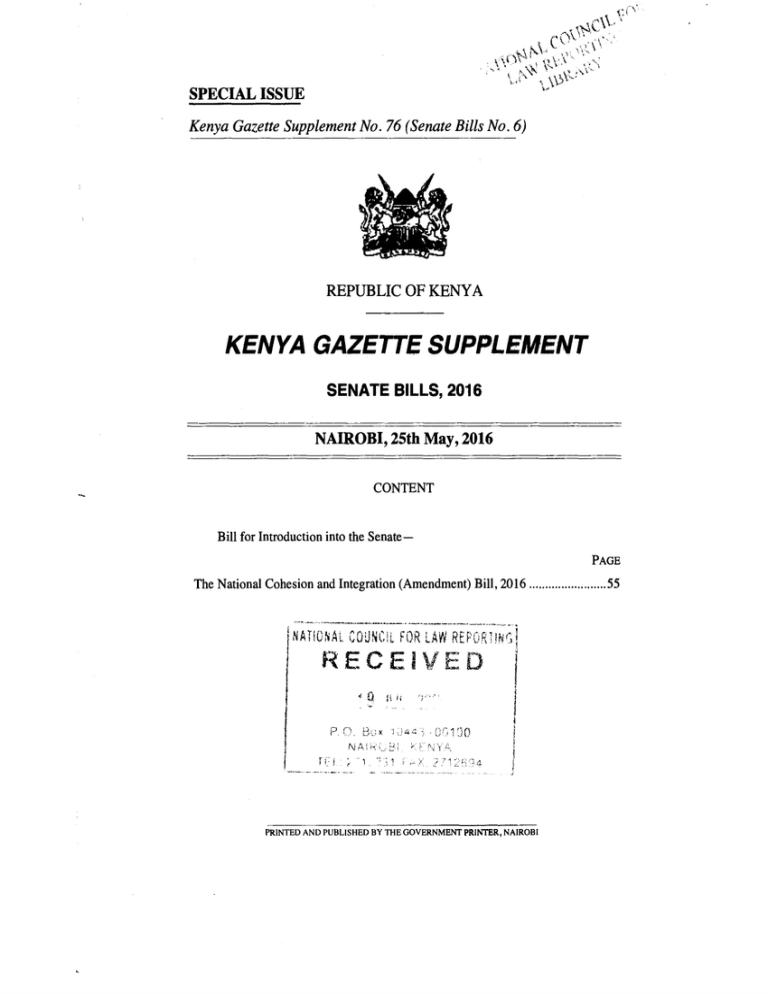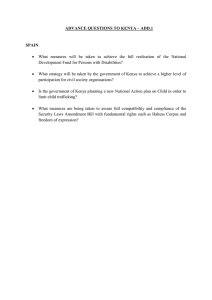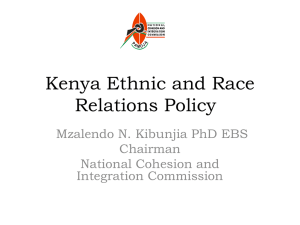The National Cohesion and Integration (Amendment
advertisement

( • * c. . 2‘`' ( SPECIAL ISSUE Kenya Gazette Supplement No. 76 (Senate Bills No. 6) REPUBLIC OF KENYA KENYA GAZETTE SUPPLEMENT SENATE BILLS, 2016 NAIROBI, 25th May, 2016 CONTENT Bill for Introduction into the Senate— PAGE The National Cohesion and Integration (Amendment) Bill, 2016 55 NATIONAL COUNCIL FOR LA? REPLa.IRUN. RECEIVED P. C). Bx 0 1. -, 1 N A N go PRINTED AND PUBLISHED BY THE GOVERNMENT PRINTER, NAIROBI 55 THE NATIONAL COHESION AND INTEGRATION (AMENDMENT) BILL, 2016 A Bill for AN ACT of Parliament to amend the National Cohesion and Integration Act to provide for oversight of peace building projects and for connected purposes ENACTED by the Parliament of Kenya, as follows1. This Act may be cited as the National Cohesion and Integration (Amendment) Act, 2016. Short title. 2. Section 2 of the National Cohesion and Integration Act, in this Act referred to as "the principal Act", is amended by inserting the following new definitions in their proper alphabetical sequence – "peace building" means non-military measures and interventions targeted at any community in Kenya for the purpose of(a) achieving sustainable peace; (b) resolving an ongoing inter-communal or intracommunal conflict; (c) reconciling communities; or (d) reducing or eliminating the risk of lapsing or relapsing into conflict by strengthening the social, economic, environmental, cultural and political capacities of the community; "peace building project" means a project or activity planned and designed for the purpose of peace building. 3. Section 25 of the principal Act is amended in subsection (2) by inserting the following new paragraphs immediately after paragraph (s)- Amendment of section 2 of No. 12 of 2008. Amendment of section 25 of No. 12 of 2008. (sa) oversee the implementation of peace building projects under this Act; (sb) set standards to be adhered to by persons involved in the implementation of peace building projects; and 4. The principal Act is amended by inserting the following new Part immediately after section 36 – Insertion of new part in No. 12 of 2008. 56The National Cohesion and Integration (Amendment) Bill, 2016 PART IIIA — PEACE BUILDING PROJECTS Functions of the Commission with respect to peace building projects. 36A. In overseeing the implementation of peace building projects, the Commission shall — (a) develop a monitoring and tracking mechanism for all peace building projects in the country; (b) develop ethical standards to be adhered to by persons involved in peace building projects; (c) undertake research and analyse and disseminate information, critical gaps and strategic priorities relevant to peace building in any particular region; (d) systematically collect information on lessons learnt in peace building; (e) advise persons involved in peace building projects on best practices for achieving lasting cohesion and integration in any particular area; (f) advise the national and county governmentsonthemost appropriate peace building interventions based on the existing circumstances of the local communities; (g) encourage national and county governments to allocate funding for peace building initiatives; (h) take measures to ensure that there is harmony in the peace building projectsundertakeninany particular area; (i) take measures to ensure that persons involved in peace building projects in the counties do not instigate, perpetuate or deepen instability or strife in any area; and The National Cohesion and Integration (Amendment) Bill, 2016 (j) perform any other function consistent with the provisions of this Act as may be necessary to carry out the objectives of this Act. 36B. A person who is in charge of a peace building project shall - Obligations of persons involved in peace building activities and projects (a) put in place measures to avert tensions, harmful competition, polarization, divisions, suspicion, biases and harmful behavior among targeted local communities as a result of the project; (b) avoid acts that subject the targeted communities to greater risk of violence or other harm; and (c) encourage participation of the target community. Register of peace building projects. 36C. (1) The Commission shall maintain a register of all peace building projects within'Kenya. Application for registration. 36D. (1) A person who intends to engage in a peace building project in Kenya shall notify the Commission of the project. (2) A notice under sub-section (1) shall be in the prescribed manner and shall, where applicable, include (a) a description of the peace building project or activity that the applicant intends to undertake; (b) a statement of the place where the peace building project is to be carried out and the targeted community; (c) a schedule of activities proposed to be undertaken in the peace building project; (d) the time-frame of the peace building project; 57 58The National Cohesion and Integration (Amendment) Bill, 2016 (e) the source of financing for the project; (f) a statement as to whether there is any conflict of interest; (g) a statement as to whether the applicant has carried out any other peace building project within the targeted community and the outcome of that peace building project; (h) the names of the officers in charge of the peace building project; and any other information that the Commission may require. (a) (3) The Commission may, upon the receipt of a notice under subsection (2)(b) note the peace building project in its register; (c) require the person or institution which gives the notice to fulfill such additional requirements as the Commission may prescribe; (d) require further details from the person or the institution that has given notice; or (e) give its approval or disapproval of the project. (4) Where the Commission requires the applicanttofulfillanyadditional requirements under subsection 3(b), the Commission shall notify the applicant of the period within which the applicant should comply. (5) Any person may make submissions to the Commission to support or oppose a proposed project in the manner and within the period prescribed by the Commission. The National Cohesion and Integration (Amendment) Bill, 2016 Certificate of approval. Disapproval of a peace building project by the Commission. 36E. Upon approval of a project, the Commission shall issue a certificate of approval to the applicant and may impose such conditions as it may consider necessary for the issuance of the certificate. 36E (1) The Commission may disapprove a peace building project(a) if the person or entity implementing the project fails to comply with any conditions imposed by the Commission; (b) if the Commission is of the view that the project will compromise gains made in achieving peace and stability in the area in which the project is being implemented; or (c) for any other reason that the Commission considers appropriate. (2) Before disapproving a project, the Commission shall notify the person in chrrge of the project and give the person an opportunity to be heard. Exemptions. 36G. (1) A person may apply to the Commission for exemption from the provisions of this Part. (2) The Commission shall, through regulations, outline the conditions for exemption from the provisions of this Act. (3) Before exempting any person from the provisions of this Part, the Commission shallconsultthePublicBenefit Organizations Authority. Review of a decision of the Commission. No.18 of 2013 36H. A person who is aggrieved by a decision of the Commission may apply for review of the decision to the Public Benefit Organizations Disputes of the Tribunal within the prescribed time and in the prescribed manner. 59 60The National Cohesion and Integration (Amendment) Bill, 2016 361. Conclusion or (1) Upon termination of a peace termination of a peace building project. the conclusion or building project, the person in charge of the project shall submit a report to the Commission in such manner as shall be prescribed by the Commission. (2) The Commission shall record the conclusion or termination of a peace building project in the register under section 36C. 5. Section 63 of the principal Act is amended by inserting a new paragraph immediately after paragraph (a)- Amendment of section 63 of No. 12 of 2008. (aa) undertakes a peace building project that is not approved under section 36E; 6. The principal Act is amended by inserting the following new sections immediately after section 70Savings and transition. 71. (1) A person who immediately before the commencement of this Act was undertaking a peace building project and intends to continue with the project(a) shall lodge an application for registration under section 36E within six monthsof the commencement of this Act; and (b) may continue with the peace building project for the duration within which the Commission considers and dispenses with the application. (2) If the Commission rejects an application for registration made pursuant to subsection (1) the peace building project shall stand terminated on the date on which the Commission notifies the applicant of the rejection of the application or on such other date as the Commission shall determine. Insertion of new clause The National Cohesion and Integration (Amendment) Bill, 2016 61 MEMORANDUM OF OBJECTS AND REASONS The principal object of this Bill is to amend the National Cohesion and Integration Act, 2012, so as to enable the Commission to effectively monitor peace building projects in Kenya. Peace building projects are an extremely sensitive tool for achieving national cohesion and integration. If not carefully executed and monitored, these activities have the potential to intensify instability, strife and division. The Bill therefore seeks to have the Commission monitor peace building projects across the country so as to ensure that these projects do not in any way fuel conflicts or fighting between communities and counties in Kenya but that they serve to promote peace and harmony in the counties. Statement on the delegation of legislative powers and limitation of fundamental rights and freedoms This Bill does not delegate legislative powers nor does it limit fundamental rights and freedoms. Statement on how the Bill concerns county governments Peace is an important factor in the success of a State. Peace has a direct impact on whether the State and its citizens are able to engage in economic activities and attain a dignified standard of living. Further, peace is critical to the success of devolution and in particular, to the successful discharge of the functions of the county governments. The regulation of peace building is therefore necessary for both the national and county levels of government so as to ensure that peace building projects promote and do not undermine cohesion at the national and county level. This Bill therefore concerns county governments in terms of Article 110(1)(a) of the Constitution as it contains provisions that affect the functions and powers of the county governments as set out in the Fourth Schedule to the Constitution. Statement that the Bill is not a money Bill, within the meaning of Article 114 of the Constitution This Bill is not a money Bill within the meaning of Article 114 of the Constitution. Dated the 28th April, 2016. BEATRICE ELACHI, Senator. 62The National Cohesion and Integration (Amendment) Bill, 2016 Section 2 of the Act that the Bill proposes to amend 2. Interpretation In this Act, unless the context otherwise requires — "Commission" means the National Cohesion and Integration Commission established by section 15; "commissioner" means a member of the Commission appointed under section 17; "development issues" includes issues relating to development in socio- cultural, political and economic sectors; "discrimination" means discrimination as defined under sections 3 and 4 of this Act; "employment" means a situation where an employee does his work wholly or partly in Kenya, (for a fee or not), for the employer; or where the employee does work for the employer outside Kenya and the employee is ordinarily resident in Kenya, either at the time he applies for the job or at any time during the course of the employment and includes a situation where the employer is working through a representative, assign or where he has sub-contracted the employment; "establishment" means a place of employment including aboard a ship or aeroplane registered in Kenya but operating internationally; "ethnic group" means a group of person defined by reference to colour, race, religion, or ethnic or national origins, and references to a person's ethnic group refers to any ethnic group to which the person belongs; "ethnic relations" include racial, religious, tribal and cultural interactions between various communities, and the words "ethnic" and "ethnicity" shall be construed accordingly; "ethnic grounds" means any of the following grounds, namely colour, race, religion, nationality or ethnic or national origins; "financial year" means a period of twelve months ending on the thirtieth June in each year; "Human Rights Commission" means the Kenya National Commission on Human Rights established under the Kenya National Commission on Human Rights Act, 2002 (No. 9 of 2002) (now repealed); and "Minister" means the Minister for the time being responsible for matters relating to justice and human rights; The National Cohesion and Integration (Amendment) Bill, 2016 63 "Secretary" means the secretary to the Commission appointed under section 20. Section 25 of the Act that the Bill proposes to amend 25. Objects and functions of the Commission ( 1 ) The object and purpose for which the Commission is established is to facilitate and promote equality of opportunity, good relations, harmony and peaceful co-existence between persons of the different ethnic and racial communities of Kenya, and to advise the Government on all aspects thereof. ( 2 ) Without prejudice to the generality of subsection (1), the Commission shall — (a) promote the elimination of all forms of discrimination on the basis of ethnicity or race; (b) discourage persons, institutions, political parties and associations from advocating or promoting discrimination or discriminatory practices on the ground of ethnicity or race; (c) promote tolerance, understanding and acceptance of diversity in all aspects of national life and encourage full participation by all ethnic communities in the social, economic, cultural and political life of other communities; (d) plan, supervise, co-ordinate and promote educational and training programmes to create public awareness, support and advancement of peace and harmony among ethnic communities and racial groups; (e) promote respect for religious, cultural, linguistic and other forms of diversity in a plural society; (f) promote equal access and enjoyment by persons of all ethnic communities and racial groups to public or other services and facilities provided by the Government; (g) promote arbitration, conciliation, mediation and similar forms of dispute resolution mechanisms in order to secure and enhance ethnic and racial harmony and peace; (h) investigate complaints of ethnic or racial discrimination and make recommendations to the Attorney-General, the Human Rights Commission or any other relevant authority on the remedial measures to be taken where such complaints are valid; (i) investigate on its own accord or on request from any institution, office, or person any issue affecting ethnic and racial relations; 64The National Cohesion and Integration (Amendment) Bill, 2016 (j) identify and analyze factors inhibiting the attainment of harmonious relations between ethnic communities, particularly barriers to the participation of any ethnic community in social, economic, commercial, financial, cultural and political endeavours, and recommend to the Government and any other relevant public or private body how these factors should be overcome; (k) determine strategic priorities in all the socio-economic political and development policies of the Government impacting on ethnic relations and advise on their implementation; (I) recommend to the Government criteria for deciding whether any public office or officer has committed acts of discrimination on the ground of ethnicity or race; (m) monitor and review all legislation and all administrative acts relating to or having implications for ethnic or race relations and equal opportunities and, from time to time, prepare and submit to the Government proposals for revision of such legislation and administrative acts; (n) initiate, lobby for and advocate for policy, legal or administrative reforms on issues affecting ethnic relations; (o) monitor and make recommendations to the Government and other relevant public and private sector bodies on factors inhibiting the development of harmonious relations between ethnic groups and on barriers to the participation of all ethnic groups in the social, economic, commercial, financial, cultural and political life of the people; (p) undertake research and studies and make recommendations to the Government on any issue relating to ethnic affairs including whether ethnic relations are improving; (q) make recommendations on penalties to be imposed on any person for any breach of the provisions of the Constitution or of any law dealing with ethnicity; (r) monitor and report to the National Assembly the status and success of implementation of its recommendations; (s) issue notices directing persons or institutions involved in actions or conduct amounting to violations of human rights on the basis of ethnicity or race to stop such actions or conduct within a given p, jod; and The National Cohesion and Integration (Amendment) Bill, 2016 65 (t) do all other acts and things as may be necessary to facilitate the efficient discharge of its functions. Section 63 of the Act that the Bill proposes to amend 63. Offences A person who — (a) subjects or threatens to subject another person to any detriment because the other person, or a person associated with the other person — (i) has made a complaint against any person; (ii) (ii) has brought any other proceedings under this Act against any person; (iii) has given evidence or information, or produced a document, in connection with any proceedings under this Act; (iv) has otherwise done anything in accordance with this Act in relation to any person; (v) has contravened a provision of Part III, unless the allegation is false and was not made in good faith; (vi) has refused to do anything that would contravene a provision of Part III; (b) fails to comply with a notice by the Commission under section 57; (c) hinders or obstructs a Commissioner, member of staff of the Commission or the Secretary in the exercise of powers or the performance of functions under this Act; (d) uses insulting language towards a Commissioner, member of staff of the Commission or the Secretary when the member or Secretary is exercising powers or performing functions under this Act; or (e) gives any information or makes any statement to the Commission, the Secretary or a person acting on behalf of the Commission or the Secretary in the exercise of powers or the performance of functions under this Act which the person knows is false or misleading in any material particular, commits an offence and shall be liable on conviction to a fine of two hundred thousand shillings or to imprisonment for a term of twelve months or to both.



